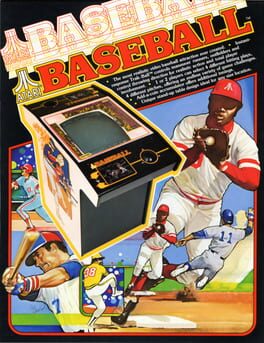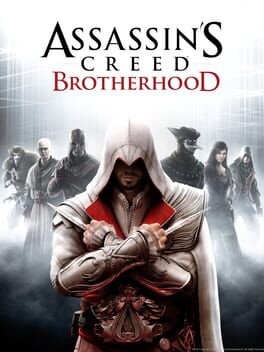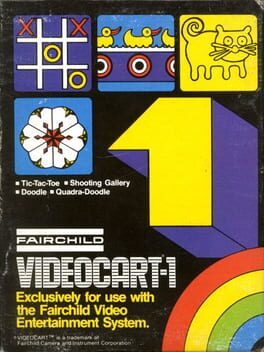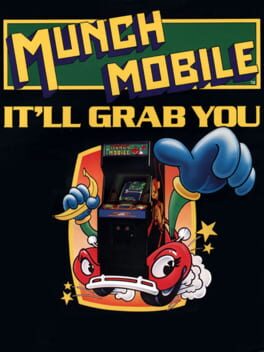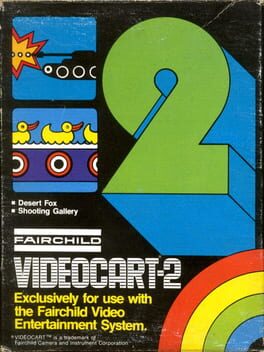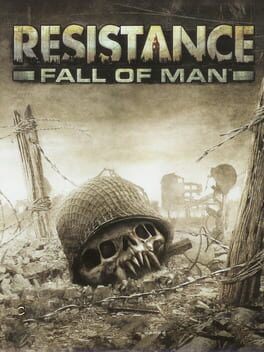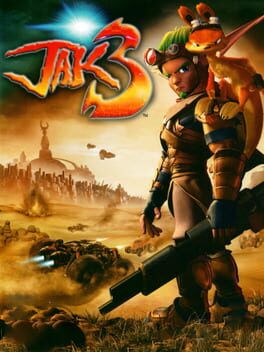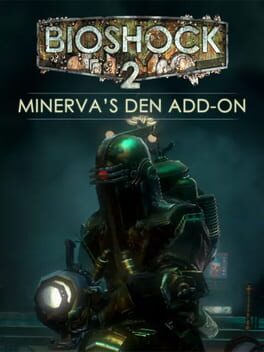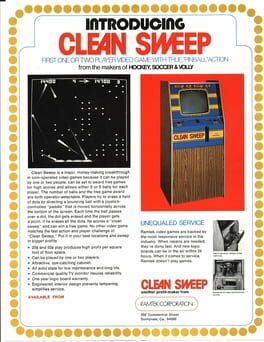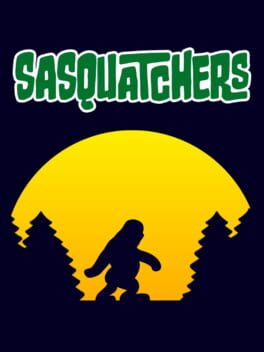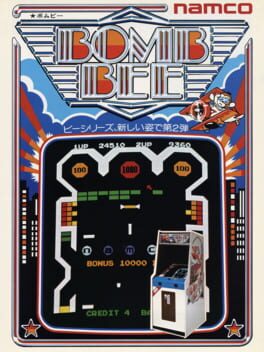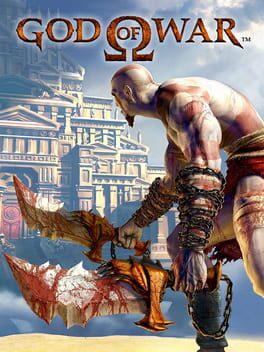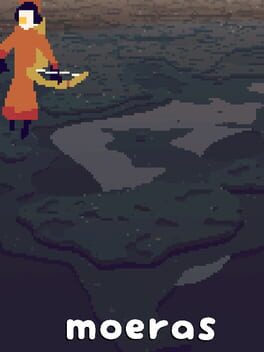1979
By all accounts, this is a sequel to Assassin's Creed II's worst tendencies, and unfortunately, it marked the course of subsequent AC entries for a while. Collecting is favored to visiting locations, dungeons and challenges are less varied, and the story takes a quick dive that it won't recover from. Ezio gets ascended from gifted Assassin to figure-that-inspires-Machiavello-to-write-the-Prince (which is such a crass way to pander players that I haven't recovered from it yet). It's a shame that this is the best looking game of the franchise thus far, because its appeal is thoroughly wasted here.
Really like the boxes of this console. The games themselves are surprisingly fine, but not very impressive. Shooting Gallery is the one that probably stands out in this particular set.
-----------------------------------------------------------------------
Me gustan mucho las cajas de esta consola. Los juegos en sí son sorprendentemente buenos, pero no muy impresionantes. Shooting Gallery es el que probablemente destaca más de este pack.
-----------------------------------------------------------------------
Me gustan mucho las cajas de esta consola. Los juegos en sí son sorprendentemente buenos, pero no muy impresionantes. Shooting Gallery es el que probablemente destaca más de este pack.
1983
Joyful Road (Munch Mobile if you're a dirty gringo) is the direct successor of SNK's Fantasy in that it leans into the farcical through a primitive but accesible arcade sensibility. Its main weakness is its extremely rigid fail states, that get progressively finickier by the hour and drain you of all lives and patience. A real shame, considering how much personality it exhibits.
------------------------------------------------------------------------------------------
Joyful Road (Munch Mobile si eres gringo) es el sucesor directo del juego Fantasy en el sentido de que se trata de una representación paródica del día a día que se canaliza mediante mecánicas arcades simplonas pero comprensibles. Su principal debilidad es que sus failstates son extremadamente rígidos, y se vuelven cada vez peores hasta dejarte sin vidas ni paciencia. Una lástima, teniendo en cuenta la personalidad que exhibe.
------------------------------------------------------------------------------------------
Joyful Road (Munch Mobile si eres gringo) es el sucesor directo del juego Fantasy en el sentido de que se trata de una representación paródica del día a día que se canaliza mediante mecánicas arcades simplonas pero comprensibles. Su principal debilidad es que sus failstates son extremadamente rígidos, y se vuelven cada vez peores hasta dejarte sin vidas ni paciencia. Una lástima, teniendo en cuenta la personalidad que exhibe.
2022
A grandes rasgos, este juego adapta los contornos de un puzzle tradicional y lo presenta con una paleta y horizontes que se sienten más cercanos a la estética de Itch.io que a la de Facebook y los tiempos de Candy Crush. A nivel de ritmo, posee una curva suave y no muy exigente, y como suplemento a él, te invita a adoptar el papel de une (aún no quemade) currante de Amazon durante un par de horas. Tengo que decir que el juego no me atrapó lo bastante para justificar mi tiempo en él, aunque me sorprendió bastante la calidad de la música.
-------------------------------------------
Broadly speaking, this game adapts the contours of a traditional puzzle title and presents it with a sheen that sits closer to the aesthetic of Itch.io than to Facebook's and Candy Crush's. In terms of rhythm, it presents a smooth enough curve, and in addition to that, it invites you play the role of a (not too burnt out) Amazon worker for a couple of hours. I have to say that the game didn't grab me enough to justify much attention, though the quality of the music caught me by surprise.
-------------------------------------------
Broadly speaking, this game adapts the contours of a traditional puzzle title and presents it with a sheen that sits closer to the aesthetic of Itch.io than to Facebook's and Candy Crush's. In terms of rhythm, it presents a smooth enough curve, and in addition to that, it invites you play the role of a (not too burnt out) Amazon worker for a couple of hours. I have to say that the game didn't grab me enough to justify much attention, though the quality of the music caught me by surprise.
The Fairchild games are probably the ones that got closer to a reflex-oriented style of gameplay after Breakout and before Space Invaders, and for that reason alone deserve a lot of respect. Other than that, Desert Fox is stunningly boring.
---------------------------------------------------------------------------
Los juegos de Fairchild son probablemente los que se acercaron más al paradigmas de juegos centrados en los reflejos después de que Breakout los "inventara" y antes de Space Invaders, y por esa razón sola merecen nuestro respeto. Aparte de eso, Desert Fox es increíblemente aburrido.
---------------------------------------------------------------------------
Los juegos de Fairchild son probablemente los que se acercaron más al paradigmas de juegos centrados en los reflejos después de que Breakout los "inventara" y antes de Space Invaders, y por esa razón sola merecen nuestro respeto. Aparte de eso, Desert Fox es increíblemente aburrido.
El equipo detrás de Ratchet & Clank intenta crear una mezcla insulsa entre Halo y Call of Duty ¿Te llama? Menudo rollo.
--------------------------------------------------------------------
The team behind Ratchet & Clank tries to an hybrid between Halo and Call of Duty. Are you excited? Just personified blandness.
--------------------------------------------------------------------
The team behind Ratchet & Clank tries to an hybrid between Halo and Call of Duty. Are you excited? Just personified blandness.
2004
Weirdly enough, this the Jak that I ended up enjoying the most. It probably had a lot to do with the fact that the tasks were a lot less repetitive and annoying and Daxter stayed quiet for a significantly longer while, but other than that, I think the one thing that made me like this game was that it didn't feel like it was trying to pad the length of the title with the same things, opting instead to do one-offs or the occasional repeat of a specific minigame. As a result, I was able to enjoy the story a lot more and wasn't that bothered by the antics of me attempting to repeat a specific task for the 10th time in a row.
This breadth was also the thing that allowed me to appreciate what this trilogy has always had since the beginning, which is a very refined sense of movement. The act itself of moving around these maps always felt nice, especially when it's not burdened by the knowledge that you're stuck with a certain quest or mission, and it's a shame that it required three titles for me to finally see it.
This breadth was also the thing that allowed me to appreciate what this trilogy has always had since the beginning, which is a very refined sense of movement. The act itself of moving around these maps always felt nice, especially when it's not burdened by the knowledge that you're stuck with a certain quest or mission, and it's a shame that it required three titles for me to finally see it.
Si no otra cosa, este DLC demuestra que puedes hacer mucho más en 4 horas de tiempo de lo que el juego original (el primer Bioshock) pudo con 12.
-------------------------------------------------------------------------------------
If anything else, this DLC proves that you can do a lot more with 4 hours than the original could in 12.
-------------------------------------------------------------------------------------
If anything else, this DLC proves that you can do a lot more with 4 hours than the original could in 12.
1974
Nowadays, this is signaled as one of the first commercial "clones" in videogame history, as we understand them today, and serves as a fascinating glimpse into the artistic impulses that propelled early developers that attempted to outbeat a hit title in their own space (previously I said that game was Breakout, which was obviously wrong. The game that they were drawing inspiration from was obviously Pong). With that being said, the notion of "clone" itself entails a series of assumptions that one can't easily apply to this particular period so easily, and if anything, it's more of a testament to the fact that we are willing to categorize the past of the medium with modern, largely broad strokes. What I can say regarding Clean Sweep in particular, I think it's apparent that the impulse here orbited around filling the screen with more stuff to do, which doesn't stray too far away from the way in which we tend to distinguish original works from copy-cats today. It's usually not a fair optic, but it's also the way in which much gaming media operates, which is a problem when trying to discern what makes a particular work significant. Unfortunately, with this game in particular in particular I don't think there's that much value to extract from, as it gets boring pretty quickly.
---------------------------------------------------------------------------------------
A día de hoy, este juego se trata como uno de los primeros "clones" comerciales en la historia de los videojuegos, tal como se entienden hoy, y sirve como muestra del tipo de impulsos artísticos que impulsaban a desarrolladores a superar un título exitoso (antes dije que era Breakout, cuando obviamente se trataba de Pong). Dicho esto, la noción de "clon" en sí implica una serie de suposiciones que uno no puede aplicar tan fácilmente a este período, y en todo caso, es más una muestra de nuestra tendencia a categorizarlo todo con brocha gorda y adecuada a nuestras sensibilidades modernas. Lo que puedo decir de Clean Sweep en particular es que, a la hora de construir su espacio de juego, parece creer que la clave es llenar la pantalla con más cosas, lo que pensándolo bien es el tipo de elemento que mucha gente emplea para distinguir un original de la copia barata. Es una mirada que puede ser muy injusta y que en ocasiones nos impide observar los detalles particulares que hacen a una obra única. Desafortunadamente, con este juego se hace difícil extraer algo de valor, porque se hace aburrido muy deprisa.
---------------------------------------------------------------------------------------
A día de hoy, este juego se trata como uno de los primeros "clones" comerciales en la historia de los videojuegos, tal como se entienden hoy, y sirve como muestra del tipo de impulsos artísticos que impulsaban a desarrolladores a superar un título exitoso (antes dije que era Breakout, cuando obviamente se trataba de Pong). Dicho esto, la noción de "clon" en sí implica una serie de suposiciones que uno no puede aplicar tan fácilmente a este período, y en todo caso, es más una muestra de nuestra tendencia a categorizarlo todo con brocha gorda y adecuada a nuestras sensibilidades modernas. Lo que puedo decir de Clean Sweep en particular es que, a la hora de construir su espacio de juego, parece creer que la clave es llenar la pantalla con más cosas, lo que pensándolo bien es el tipo de elemento que mucha gente emplea para distinguir un original de la copia barata. Es una mirada que puede ser muy injusta y que en ocasiones nos impide observar los detalles particulares que hacen a una obra única. Desafortunadamente, con este juego se hace difícil extraer algo de valor, porque se hace aburrido muy deprisa.
2021
2022
Aunque Sasquatchers no puede evitar parecerse a los juegos de estrategia prototípicos de portátiles anteriores como Game Boy Advance (y el juego tiene la decencia de reconocerlo con un par de referencias), el giro de su aplicación es más interesante y particular de lo que podrá parecer. Mediante una pequeña pero cuidada selección de monstruos que debes fotografiar y documentar, el juego te propulsa por distintos mapas y te sugiere la promesa de muchos más. Teniendo en cuenta las herramientas de que dispones para documentar a estos monstruos, no creo que el juego pudiera sostenerse ni que fuera con una criatura más, pero creo que hace un trabajo bastante decente al tiempo de que provee de un estilo visual desenfadado.
-------------------------
While Sasquatchers can't help being a pastiche of early handheld strategy (and the game has the decency to acknowledge it), the twist of its presentation is more appealing and unique than it may seem. Through a small but thoughtful selection of monsters that you must photograph and document, the game propels you through different maps and hints at the promise of many more. Considering the tools you have at your disposal, I don't think the game would hold up if it tried to even just one more creature, but it does a pretty decent job with what it has while providing a lighthearted visual style.
-------------------------
While Sasquatchers can't help being a pastiche of early handheld strategy (and the game has the decency to acknowledge it), the twist of its presentation is more appealing and unique than it may seem. Through a small but thoughtful selection of monsters that you must photograph and document, the game propels you through different maps and hints at the promise of many more. Considering the tools you have at your disposal, I don't think the game would hold up if it tried to even just one more creature, but it does a pretty decent job with what it has while providing a lighthearted visual style.
1979
Much better than Gee Bee. I like it that instead of going back to a more conservative design, the people behind the original Bee moved on to refine their Pinball-in-name-only advance to design, and went on to create an interesting variation that's able to stand on its own.
----------------------------------------------------------------------------------
Mucho mejor que Gee Bee. Me gusta que, en lugar de retraerse a un diseño conservador, la gente detrás del Bee original pasó a refinar su estilo de "hacer un Pinball pero sólo en apariencia" y crear una variación interesante y capaz de defenderse por sí misma.
----------------------------------------------------------------------------------
Mucho mejor que Gee Bee. Me gusta que, en lugar de retraerse a un diseño conservador, la gente detrás del Bee original pasó a refinar su estilo de "hacer un Pinball pero sólo en apariencia" y crear una variación interesante y capaz de defenderse por sí misma.
2005
Even for the time, this was a fairly mediocre hack n' slash, and even though it codified some staples of the genre (like the boss fights), they barely hold together against today's offers.
What makes this game tick (and what makes it so dear to industry watchdogs) is its presentation. This game is a triumph of graphical fidelity, and even now one can be easily swept away by the spectacle. And for one, the protagonist doesn't feel completely hopeless as a vehicle of murder and mayhem. But let's not kid ourselves: these games were never about anything but murder and mayhem
What makes this game tick (and what makes it so dear to industry watchdogs) is its presentation. This game is a triumph of graphical fidelity, and even now one can be easily swept away by the spectacle. And for one, the protagonist doesn't feel completely hopeless as a vehicle of murder and mayhem. But let's not kid ourselves: these games were never about anything but murder and mayhem
2018
Comparando los juegos antiguos de Sokpop con los más recientes, siento que están pasando por una especie de normativización de sus obras. Recuerdo claramente jugar a Moeras hace años, sabiendo de los juegos Souls poco más que lo que había visto de Demon's, y me sentí muy cautivado no porque esto fuera una experiencia fiel a su estética, sino porque conseguía evocar un mundo entero con muy poco. Cierto es que, en aquél entonces, apenas podías hacer nada con ese mundo. Pero luego juegas a Brume, y sientes que ese más hacer no se traduce necesariamente en conocer mejor ese mundo.
---------------------------
Comparing Sokpop's older games to their more recent ones, I feel like they're going through a sort of normativization process. I distinctly remember playing Moeras years ago, knowing little more about Souls games than what I had seen of Demon's, and I was captivated. Not because this was a faithful adaptation of their aesthetic, but because it managed to evoke an entire world with so little. It's true that, back then, you could barely do anything in that world. But then you play Brume, and I get the feeling that being able to do more doesn't necessarily translate into knowing that world better.
---------------------------
Comparing Sokpop's older games to their more recent ones, I feel like they're going through a sort of normativization process. I distinctly remember playing Moeras years ago, knowing little more about Souls games than what I had seen of Demon's, and I was captivated. Not because this was a faithful adaptation of their aesthetic, but because it managed to evoke an entire world with so little. It's true that, back then, you could barely do anything in that world. But then you play Brume, and I get the feeling that being able to do more doesn't necessarily translate into knowing that world better.
